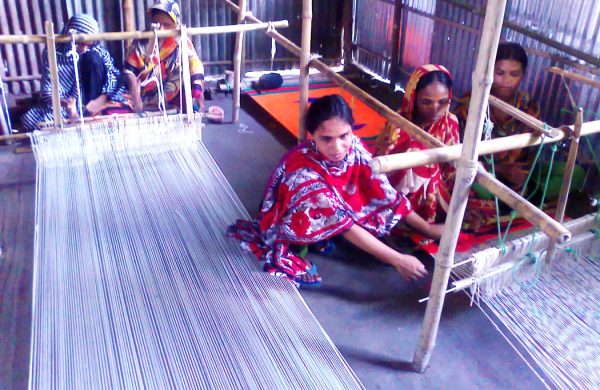Unity to overcome climate adversity: Women entrepreneurs of Char Montaz
- Update Time : Sunday, May 4, 2025

Patuakhali Correspondent:
Shilpa Rani, 30, is a resident of the Char Montaz union in the coastal district of Patuakhali. She has three children, two of whom are in school. Her husband is a local fisherman who remains unemployed for almost half of the year when fishing is banned.
Her husband’s seasonal income motivated Shilpa to financially empower herself. She tried her luck at any household gig she could find in her community — be it kit stitching or cleaning — but none provided a stable source of income.
Things finally changed in 2019 when she came across the LoGIC project, a multi-donor initiative supported by the Government of Bangladesh, UNCDF, Sweden, and Denmark. The project aims to support vulnerable women in marginalised, climate-affected communities through training, financial inclusion and small grants.
Through LoGIC, Shilpa opened her first bank account, received multiple rounds of skills training, and secured a Tk30,000 grant. With this support, she ventured into small-scale farming and poultry rearing.
But Char Montaz, perched along the Bay of Bengal, is no ordinary place to start an agricultural business. Prone to flooding, riverbank erosion, cyclones, and soil salinity, the region presents a harsh environment for traditional farming.
Unsurprisingly, Shilpa’s first attempts were thwarted; cyclones washed away her crops, and disease wiped out her poultry.
She was not alone in this struggle. Many women tried and failed to establish independent ventures.
“This is when [in 2023] it was suggested they form a cooperative and come up with a business idea which is feasible and sustainable,” said Shahnin Moshrefa Shilpy, District Climate Change Coordinator (DCCC) at UNDP Bangladesh.
TEAMWORK OVER INDIVIDUAL VENTURES
Together, the women of Char Montaz launched a cooperative by pooling funds. Each share was priced at Tk1,000, and members were encouraged to buy a minimum of 10. However, extreme poverty made this impossible for many.
“We didn’t leave anyone behind,” said Shilpa. “Some women could only afford one or two shares, but we all work together equally.”
Their business model begins at the source: buying raw fish directly from fishermen’s boats. The fish are sorted into two streams, one for dry fish production for human consumption, the other for making agro-feed using small or damaged fish and prawn heads.
WOMEN INVOLVED IN SORTING ARE PAID DAILY WAGES
“This provides the women with an additional stream of income beyond their share of business profits. It helps them manage daily expenses and keeps them engaged and motivated. On particularly busy days, they even bring in other women from the community to help with the sorting,” said Shahnin.
After sorting, the fish are dried. If the sun is generous, the small fish, used in making agro feed, are sold in a day.
Local vendors collect these fish everyday and resell them. Hence, they do not need an inventory to store this particular category of product.
On the other hand, fish for human consumption are dried in a separate zone while maintaining hygiene protocols, without the usage of any preservatives. It takes two to three days to dry these fish.
The women leased a piece of land to process the fish and made an inventory to store the ones for human consumption. Once the fish are ready, the majority of them are handed over to the vendors who resell them all over the country.
A small portion is also packed and labelled by the women for local retail sale.
A PROFITABLE MODEL
This multi-stream business has proven both sustainable and profitable. Profits are now reinvested in operations and distributed among members according to their shares.
Since December 2024, a total of 878 women have joined the dry fish initiative, working under four cooperatives divided into 64 groups, all governed by a 12-member executive committee.
“These women have always been hardworking,” said Shahnin. “They just lacked a platform to convert that hard work into sustainable income.”
Now, with no chemicals or preservatives, their dried fish is a high-quality, natural product that has gained popularity. The dual-income model, from both agro-feed and human-grade dried fish, adds resilience and flexibility.
“To be financially independent is empowering,” said Shilpa. “And being able to support my children’s education means everything to me.”
The initiative’s success was recently showcased at the Bangladesh Investment Summit 2025, underlining its potential for expansion. The women now hope to scale their operations with better logistics, processing infrastructure, and year-round business.
















